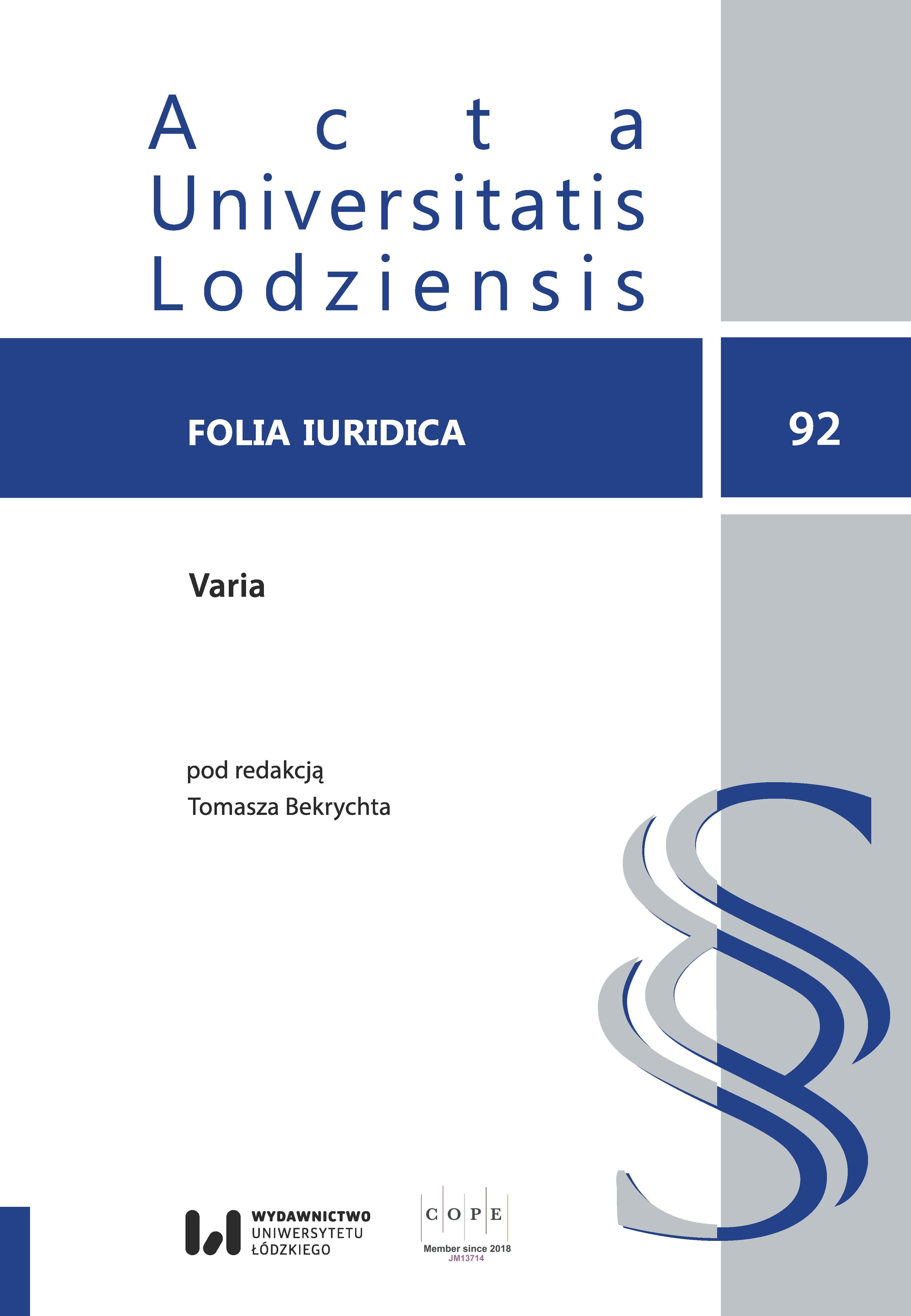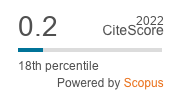Philosophical Approach to the Statutory Drafting
DOI:
https://doi.org/10.18778/0208-6069.92.04Keywords:
legislation, new constitutionalism, narratives, bureaucracy, statutory draftingAbstract
This article traces the relationship between the law-making process and narratives. Undoubtedly, how statutes are created is a constitutional question, yet the Constitution regulates only part of this process. Constitution or any statute does not regulate parts of the legislative process implemented by the government (mostly preliminary phases). However, they are important and influence the remaining parts of the law-making process. This government’s activity is the sphere of informal regulation hidden from the primary control of the public. This article explores the importance of the bureaucratic elements of the law-making process with emphasis on a narrative approach: narratives justify legislature. How can we overcome the two lines of narratives – one produced by global capital and the other represented by national experience?
Downloads
References
Althusser, Louis. 2014. On the Reproduction of Capitalism: Ideology and Ideological State Apparatuses. New York: Verso.
Google Scholar
Bacon, Francis. 1785. Reading upon the Statute of Uses. London: E. Brooke, Bell Yard, Temple Bar.
Google Scholar
Baudrillard, Jean. 1994. Simulacra and Simulation. Ann Arbor: University of Michigan Press.
Google Scholar
DOI: https://doi.org/10.3998/mpub.9904
Bauman, Zygmunt. 1989. Modernity and Holocaust. Cambridge: Polity Press.
Google Scholar
Benedict XVI. 2009. Caritas in veritate. http://w2.vatican.va/content/benedict-xvi/en/encyclicals/documents/hf_ben-xvi_enc_20090629_caritas-in-veritate.html [accessed: February 29, 2020].
Google Scholar
Benjamin, Walther. 1988. Illuminations. New York: Random House.
Google Scholar
Bentham, Jeremy. 1843. The Works of Jeremy Bentham. Vol. 3. Edinburgh: William Tait.
Google Scholar
Bielska-Brodziak, Agnieszka. 2017. Śladami prawodawcy faktycznego: materiały legislacyjne jako narzędzie wykładni prawa. Warszawa: Wolters Kluwer.
Google Scholar
Borowicz, Adam. 2009. “Argument interpretacyjny odwołujący się do woli rzeczywistego prawodawcy”. Studia Prawno-Ekonomiczne 79: 9–28.
Google Scholar
Bourdieu, Pierre. 1987. “The Force of Law: Toward a Sociology of Juridical Field”. The Hastings Law Journal 38(5): 814–853.
Google Scholar
Bourdieu, Pierre. 1991. Language and Symbolic Power. 7th printing. Cambridge: Harvard University Press.
Google Scholar
Bourdieu, Pierre. 1996. The Rules of Art: Genesis and Structure of the Literary Field. Stanford: Stanford University Press.
Google Scholar
DOI: https://doi.org/10.1515/9781503615861
Bourdieu, Pierre. 1999. Outline of a Theory of Practice. 14th printing. Cambridge: Cambridge University Press.
Google Scholar
Bourdieu, Pierre. 2001. Masculine Domination. Stanford: Stanford University Press.
Google Scholar
Bourdieu, Pierre. Randal Johnson, 1993. The Field of Cultural Production: Essays on Art and Literature. New York: Columbia University Press.
Google Scholar
Brooks, Peter. 2002. “Narrativity of the Law”. Law and Literature 14(1): 1–10.
Google Scholar
DOI: https://doi.org/10.1525/lal.2002.14.1.1
Calabresi, Guido. 1982. Common Law for the Age of Statutes. Cambridge: Harvard University Press.
Google Scholar
Cohen, Stanley. 2011. Folk Devils and Moral Panics: the Creation of the Mods and Rockers. New York: Routledge.
Google Scholar
DOI: https://doi.org/10.4324/9780203828250
Cover, Robert M. 1983. “Foreword: Nomos and Narrative”. Harvard Law Review 97(1): 4–68.
Google Scholar
DOI: https://doi.org/10.2307/1340787
Cover, Robert M. 1985. “Folktales of Justice: Tales of Jurisdiction”. Capital University Law Review 14(2): 179–204.
Google Scholar
Dawkins, Richard. 1998. “Postmodernism Disrobed”. Nature 394(6689): 141–143.
Google Scholar
DOI: https://doi.org/10.1038/28089
Eco, Umberto. 1981. The Role of the Reader: Explorations in the Semiotics of Texts. Bloomington: Indiana University Press.
Google Scholar
Foucault, Michel. 1979. Discipline and Punish: the Birth of the Prison. New York: Vintage Books.
Google Scholar
Geertz, Clifford, 1973. The Interpretation of Cultures: Selected Essays. New York: Basic Books.
Google Scholar
Krygier, Martin. 1988. “The Traditionality of Statutes”. Ratio Juris 20(1): 20–39.
Google Scholar
DOI: https://doi.org/10.1111/j.1467-9337.1988.tb00002.x
Lukács, Georg. 1971. History and Class Consciousness: Studies in Marxist Dialectics. 6th printing. Cambridge: MIT Press.
Google Scholar
Lyotard, Jean-François. 1984. The Postmodern Condition: a Report on Knowledge. Minneapolis: University of Minnesota Press.
Google Scholar
DOI: https://doi.org/10.2307/1772278
Mannheim, Karl. 1966. Ideology and Utopia: an Introduction to the Sociology of Knowledge. Reprinted. London: Routledge & Kegan Paul.
Google Scholar
Mańko, Rafał. 2018. W stronę krytycznej filozofii orzekania. Polityczność, etyka, legitymizacja. Łódź: Wydawnictwo Uniwersytetu Łódzkiego.
Google Scholar
McKinley, Bob. 2000. “Postmodernism Certainly Is Not Science, but Could It Be Religion?” CSAS Bulletin 36(1): 16–18.
Google Scholar
DOI: https://doi.org/10.1525/csas.2000.36.1.16
Montesquieu, Michel de. 1777. The Complete Works of M. de Montesquieu in Four Volumes. Volume the Second. The Spirit of Laws. Dublin: W. Watson et al.
Google Scholar
Paulus, Ingeborg. 1974. The Search for Pure Food: a Sociology of Legislation in Britain. London: M. Robertson.
Google Scholar
Robinson, Chester A. 1991. The Bureaucracy and the Legislative Process: a Case Study of the Health Care Financing Administration. University Press of America.
Google Scholar
Savigny, Friedrich Karl von. 1999. Of The Vocation of our Age for Legislation and Jurisprudence. Kitchener: Batoche.
Google Scholar
Smejkalová, Terezie. Martin Škop. 2017. “A Concept of a Reader in Legislation Drafting”. In Argumentation 2017. 51–69. Edited by Markéta Štěpáníková et al. Brno: Masaryk University.
Google Scholar
Streeck, Wolfgang. 2017. “Caution: European Narrative. Handle with Care!” In European Union and Disunion: Reflections on European Identity. 14–22. Edited by Ash Amin, Philip Lewis. London: The British Academy.
Google Scholar
Sullivan, Ruth. 2007. Statutory Interpretation. 2nd edition. Ottawa: Irwin Law.
Google Scholar
Škop, Martin. Barbora Vacková. 2019. “Být legislativcem: Empirická šetření v administrativních fázích legislativy”. Časopis pro právní vědu a praxi 27(1): 5–28.
Google Scholar
DOI: https://doi.org/10.5817/CPVP2019-1-1
Škop, Martin. Monika Hanych. Michal Malaník. Terezie Smejkalová. Markéta Štěpáníková. Barbora Vacková. 2019. Tvorba práva – Empirické studie. Brno: Masarykova Univerzita.
Google Scholar
Tait, Allison. Luke Norris. 2011. “Narrative and the Origins of Law”. Law and Humanities 5(1): 11–22.
Google Scholar
DOI: https://doi.org/10.5235/175214811796219745
Wronkowska, Sławomira. 1987. “The Rational Legislator as a Model of Real Lawmaker”. In Polish Contributions to the Theory and Philosophy of Law. 179–188. Edited by Zygmunt Ziembiński. Amsterdam: Rodopi.
Google Scholar
Downloads
Published
How to Cite
Issue
Section
License

This work is licensed under a Creative Commons Attribution-NonCommercial-NoDerivatives 4.0 International License.













